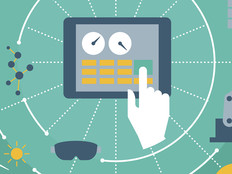Microsoft Aims to Make It Easier for Businesses to Deploy IoT Solutions
Based on how much buzz Internet of Things applications get, one would be forgiven in thinking that almost every business has some sort of IoT solution deployed. The reality is that many companies are still trying to figure out IoT applications and how to manage them. That’s especially true for the Industrial Internet of Things involving manufacturing and industrial equipment.
Last month, Microsoft announced the rollout of a cloud-based tool called IoT Central that aims to simplify IoT deployments for businesses and make them easier to manage.
IoT adoption is increasing, according to industry surveys, but there are still large swaths of the business world, in companies large and small, that have not yet deployed connected devices and sensors. According to International Data Corp.’s “2016 Global IoT Decision Maker Survey,” released in September 2016, 31.4 percent of organizations surveyed had launched IoT solutions, with an additional 43 percent looking to deploy in the next 12 months. Meanwhile, a survey from online community Spiceworks, also released last fall, found that nearly 20 percent of all organizations surveyed had deployed IoT technologies on their networks and that an additional 40 percent plan to adopt them in the future.
In a company blog post, Sam George, partner director for Azure IoT at Microsoft, says that IoT “is quickly becoming a critical aspect of doing business. In the same way that web, mobile and cloud technologies have powered digital transformation, IoT is the next big catalyst.” However, he notes that “while IoT brings a new set of benefits for companies that want to keep an edge on their competition, it brings challenges too — IoT solutions can still be complex, and a shortage of skills makes it difficult for everyone to take advantage of this new innovation.”
Microsoft Promises to Make IoT Deployments Simpler
To help businesses deploy IoT solutions, Microsoft says its IoT Central tool will help them get off the ground even if they do not have in-house cloud expertise. IoT Central is a fully managed Software as a Service tool built on the Azure cloud platform.
IoT Central will be available along with Microsoft’s existing Platform as a Service solution, Azure IoT Suite, which enables deep customization and full control when developing the back end for IoT apps, according to George. “This new IoT SaaS offering has the potential to dramatically increase the speed at which manufacturers can innovate and bring new products to market, as well as lower the barriers to creating IoT solutions that generate new revenue opportunities and better experiences for customers,” he says.
So what does IoT Central do? It lets companies deploy IoT solutions via the cloud, allowing users to monitor devices via a cloud-based dashboard. Analytics derived from the tool can help companies realize new revenue opportunities via predictive maintenance subscriptions for customers, for example. The tool provides security of devices, connections and data.
As TechCrunch reports, the tool “provides a fully featured solution that abstracts all of the underlying infrastructures away and lets business focus on analyzing their data. It comes with pre-configured solutions for many typical use cases. What users lose, though, is the flexibility to choose their own storage service or analytics engines, for example.”
“It is designed to enable the rapid innovation, design, configuration, and integration of smart products with enterprise-grade systems and applications to reduce product manufacturers’ go-to-market cycle and increase the speed at which they can innovate so they can stay ahead of their competition and deliver smart products that delight their customers,” a Microsoft spokesperson told ZDNet.
Simultaneously, Microsoft introduced the public preview of Azure Time Series Insights, a fully managed analytics, storage and visualization service. The service makes it incredibly simple to interactively and instantly explore and analyze billions of events from sources such as the Internet of Things.
TechCrunch reports: “While there are plenty of exceptions, IoT data tends to arrive in a time-based fashion and Time Series Insights is purpose-built to store and interactively visualize and analyze this type of data to find anomalies. For developers, the service also offers an [application programming interface] to integrate it into existing workflows.”
Firms Have IoT Skills Gaps
There is enthusiasm for IoT, and especially for the Industrial IoT. However, many companies are not yet ready to take advantage of IIoT, according to a survey released last month by the Business Performance Innovation (BPI) Network.
The survey found that 52 percent of executives at large companies expect the IIoT to have a “significant or major” impact on their industry within three years, and 41 percent of executives at all companies say the same thing. Further, 55 percent of those polled said the IIoT is already gaining traction, either via pilot programs or larger-scale deployments.
Crucially, however, just 1.5 percent of respondents at large companies said they “have a clear vision with implementation well underway” for IIoT, while 57 percent are beginning to implement IIoT systems, have launched pilots or plan to move forward as they plot their strategies.
According to the survey, executives say new technical skills (51 percent), better data integration and analytics capabilities (41 percent), and rethinking the business model (33 percent) will be needed to take advantage of IIoT. However, most executives say their companies have significant gaps in these areas.
Nearly a third (31 percent) say their organizations face a “major skill gap” in their IIoT readiness, while another 31 percent say the talent gap is “large, but improving somewhat.” Similarly, just 12 percent give their companies an “excellent” rating in their capacity to develop and deploy apps that use real-time insights and systems monitoring. Another 25 percent rate their capacity as good, while a third say their corporations’ ability in this area is moderate and improving.
The survey covered 350 executives around the world from companies such as Airbus, Philips Lighting, Whirlpool and Hitachi. It was developed by the BPI Network in partnership with the CMO Council, Penton’s IoT Institute and The Nerdery, a digital strategy and software engineering firm.









